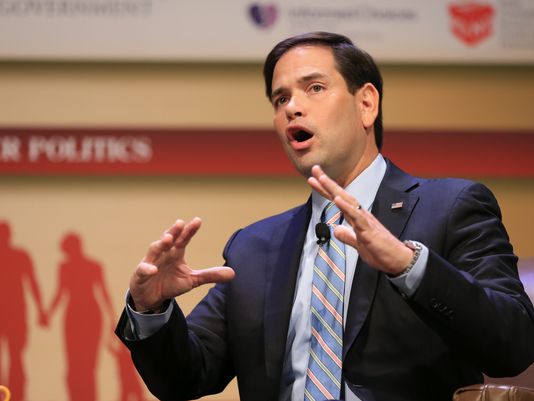
WASHINGTON — Florida Sen. Marco Rubio has worked to stand out in the crowded field of GOP presidential candidates as a foreign policy hawk who would reverse President Obama's direction on global affairs.
On Russia's aggression in Ukraine, Islamic fighters in the Middle East, alleged cyber attacks by China and other threats, he's repeatedly slammed the president for not being more aggressive. That failure, he said, has compromised U.S. credibility and respect and has undermined our allies.
On Thursday, Rubio will get the chance to directly confront the White House on what is arguably Obama's biggest foreign policy gamble: an agreement that aims to curb Iran's ability to develop nuclear weapons.
Rubio sits on the Senate Foreign Relations Committee, which will hold the first of what's expected to be several hearings to examine the agreement, announced July 14. Congress has 60 days to review the deal and decide whether to accept or reject it.
It's doubtful Secretary of State John Kerry and other administration surrogates at the hearing will win over Rubio, who has already dismissed the agreement as "Barack Obama's deal with Iran."
But Rubio will be playing to a bigger stage than a Senate committee room. Thursday's hearing will offer him a spotlight on Iran, one of his favorite topics and likely a key issue in the 2016 presidential race.
A Gallup poll in May found that Americans ranked the economy, how Washington operates, health care policy, terrorism and income distribution as more important than foreign policy.
But Richard Haass, president of the Council on Foreign Relations, says international concerns are likely to weigh heavily in the GOP primary.
"The economy is improving under President Barack Obama, making it a less attractive political target," Haass wrote recently. "Global turbulence, by contrast, has given the Republicans more room to attack Obama and the Democrats."
Few among the 16 announced Republican candidates have been as activist as Rubio on foreign policy matters.
In a May speech, the freshman senator outlined the three pillars of what's been dubbed the Rubio Doctrine: preserving America's military supremacy worldwide, using that force to protect U.S. economic interests, and projecting American ideals abroad.
"Since the end of the Cold War, the threats facing America have changed, but the need for American strength has not," Rubio said in his speech. "It has only grown more pressing as the world has grown more interconnected."
His interventionist attitude offers a stark contrast to another GOP presidential candidate: Kentucky Sen. Rand Paul.
The two have clashed over the government's collection of phone records (Rubio supports it), U.S. military presence in the Middle East to combat terrorists (Paul generally opposes it), and the administration's decision to normalize relations with Cuba (Rubio, the son of Cuban immigrants, calls it "capitulation").
Paul also sits on the Foreign Relations Committee and has similar misgivings about the deal that the U.S. and its international negotiating partners cut with Iran.
As he urges his colleagues to reject the deal, Rubio worries Obama's successor will have to undo the damage caused by a flawed agreement.
"It will be left to the next president to quickly reimpose nuclear sanctions on Iran and to place additional sanctions on Iran's leaders because of their ongoing support for terrorism and their human rights abuses," he said.
- Publish my comments...
- 0 Comments
